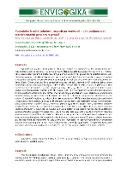Podmínky k udržitelnému rozvoji na venkově - jak podporovat transformační procesy v praxi?
( Conditions for sustainable development in rural areas - how to support transformation processes in practice? )

Publication date
2021Published in
EnvigogikaVolume / Issue
16 (2)ISBN / ISSN
ISSN: 1802-3061Metadata
Show full item recordCollections
This publication has a published version with DOI 10.14712/18023061.633
Abstract
Východiskem úvah o strategiích udržitelnosti regionálního rozvoje jsou Cíle udržitelného rozvoje (SDGs) a jak se promítají na místní úroveň. Článek soustřeďuje pozornost na cíl č. 4 - vzdělávání, které může významně podporovat implementaci dalších cílů, pokud cílí na důležité aktéry udržitelného rozvoje. Cílem výzkumu bylo zmapovat aktuální situaci v regionech ČR a zjistit, jakou úlohu vzdělávání na místní úrovni v kontextu udržitelného rozvoje plní (a mělo by plnit), a jaké jsou v této souvislosti role jednotlivých aktérů rozvoje venkova. Otázky, které si řešitelský tým kladl v rámci školení pro představitele místních akčních skupin (MAS), byly formulovány a následně distribuovány formou plošného dotazníkového šetření mezi manažery/manažerkami MAS. Data byla vyhodnocena kvantitativními, a především kvalitativními metodami, s důrazem na jedinečné zkušenosti a postřehy. Z výsledků vyplývá, že místní aktéři (reprezentovaní MAS) si uvědomují potřebu vzdělávání i nedostatky v této oblasti, a chápou též důsledky tohoto stavu pro udržitelný rozvoj v environmentální, ekonomické i sociální oblasti. Potenciál jednotlivých aktérů (jejich role v procesech udržitelnosti) zůstává nevyužit, což ovlivňuje schopnost inovací.
The Sustainable Development Goals (SDGs) and how they translate to the local level are the starting point for thinking about regional sustainability strategies. The article focuses on Goal 4 - education, which can significantly support the implementation of other goals if it targets important actors of sustainable development. The aim of the research was to map the current situation in the regions of the Czech Republic with regards to the (prospective) role of education at the local level, and to analyse the needs of individual actors of rural development and their potential input in the context of education for sustainable development. The questions (that the research team asked in the framework of the training for representatives of Local Action Groups (LAGs)) were formulated and subsequently distributed in the form of a questionnaire survey among LAG managers. The data was evaluated using quantitative and mainly qualitative methods, with emphasis on unique experiences and insights. The results show that local actors (represented by LAGs) are aware of the need for training and the shortcomings in this area, and also understand the implications of this deficiency for sustainable development in the environmental, economic and social spheres. The potential of individual actors (their role in sustainability processes) remains untapped, which affects the capacity to innovate.
Keywords
udržitelný rozvoj venkova, SDGs, vzdělávání pro udržitelný rozvoj, celoživotní učení, místní akční skupiny, sociální kapitál
sustainable development of regions, SDGs, education for sustainable development, lifelong learning, Local Action Groups, social capital
Permanent link
https://hdl.handle.net/20.500.14178/3063License
Full text of this result is licensed under: Creative Commons Uveďte původ 4.0 International




